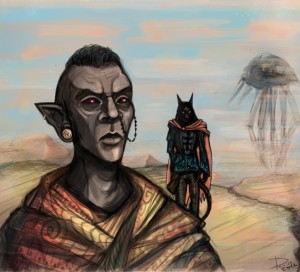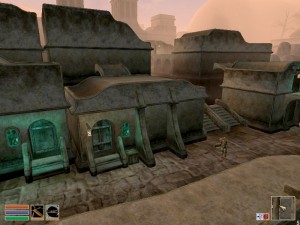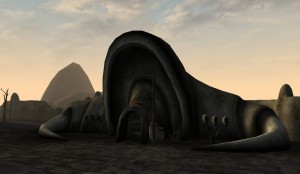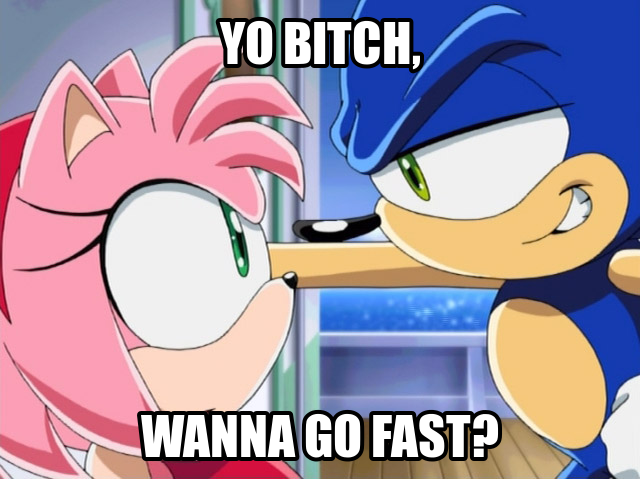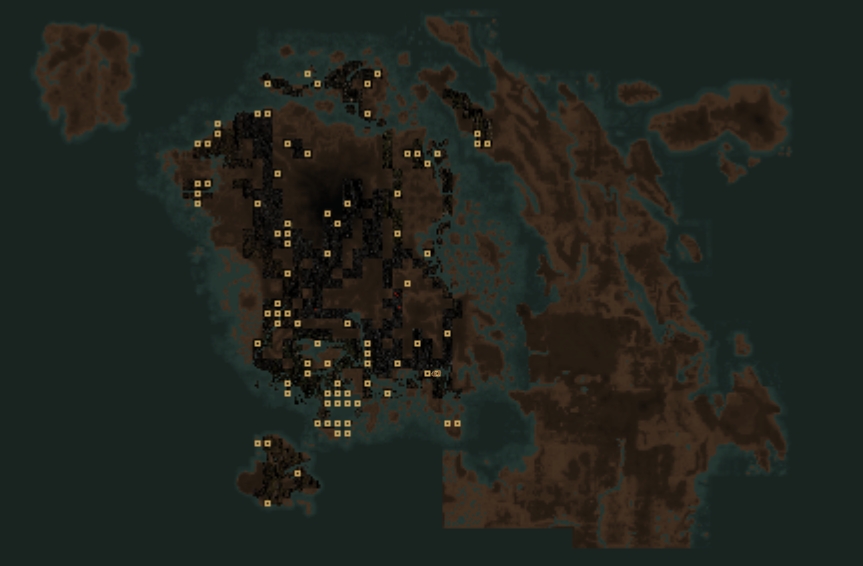I hear you groaning, dear reader. “Another Morrowind post? Pike, you need to start playing something else!”
And perhaps I do, but not before I write up a little treatise on it and what makes it so special. I mean, it’s far from a perfect game. The actual gameplay itself, in fact, is somewhat flawed. It’s certainly not bad, but it’s not astounding, either, and the combat system is almost universally criticized. Just what is it about Morrowind, then, that draws you in?
For me, it’s the in-game culture. You see, while other people bandy around the idea of less-generic fantasy, Morrowind pulled this off with aplomb ten years ago.
It’s really an anomaly not just among the general fantasy genre but within the Elder Scrolls series itself. The first two games in the TES main series were called Arena and Daggerfall, and although they both achieved cult classic status there’s also a reason why most people today haven’t heard of them, so don’t feel too bad if you haven’t, either. Anyways, these two games set the general tone for the series as a very Dungeons and Dragons inspired medieval fantasy. Arena took you across the entire continent of Tamriel and every province could have been lifted directly from Lord of the Rings, if Lord of the Rings had been built in Minecraft. Daggerfall limited you to a smaller area (in theory, anyway– its random map generation was nearly limitless), but the overall style was still the same.
Then Morrowind came along. Morrowind is populated by Dark Elves, or Dunmer in their native tongue. And that is where all similarities to traditional western fantasy end.
Morrowind is not medieval Europe. Morrowind was actually inspired by Egyptian, early Japanese, and Middle Eastern cultures. And the keyword “inspired” is very important, here, because the developers and artists didn’t just take those cultures and transplant them, wholesale, into Tamriel. Instead, they used these cultures as inspirations to create their own very vibrant land and people.
Let’s start out by talking about the world. There are no horses in Morrowind. There are, however, giant dinosaur things which are used as pack animals.
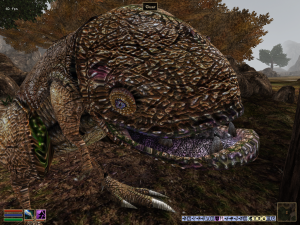
There are also flying reptile things
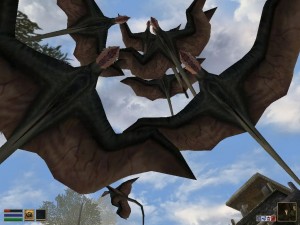
And gigantic fleas the size of elephants (or larger) which are used to travel from town to town.
 Insects are actually a major part of society here on Vvardenfell, where various giant bugs are farmed and ranched. The are no sheep or cows here, only giant floating jellyfish.
Insects are actually a major part of society here on Vvardenfell, where various giant bugs are farmed and ranched. The are no sheep or cows here, only giant floating jellyfish.
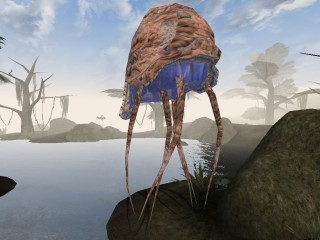 Now let’s talk about the inhabitants of this strange land. Traditionally the Dunmer are nomads who live in yurts. Yurts. There are major characters of this game who spend the entire game quite happily living in a yurt. When was the last time you saw that in a fantasy game? They dress like nomads do, too, wearing different types of clothing depending on where their tribe is currently located, based on what resources are available to them. There has been a shift from this traditional style of living toward living in buildings in cities like the Empire does, and the traditional nomadic Dunmer– called Ashlanders– are not particularly happy about this development. Still, these city-dwelling elves don’t live in anything that we would remotely identify as a traditional house. They live in these:
Now let’s talk about the inhabitants of this strange land. Traditionally the Dunmer are nomads who live in yurts. Yurts. There are major characters of this game who spend the entire game quite happily living in a yurt. When was the last time you saw that in a fantasy game? They dress like nomads do, too, wearing different types of clothing depending on where their tribe is currently located, based on what resources are available to them. There has been a shift from this traditional style of living toward living in buildings in cities like the Empire does, and the traditional nomadic Dunmer– called Ashlanders– are not particularly happy about this development. Still, these city-dwelling elves don’t live in anything that we would remotely identify as a traditional house. They live in these:
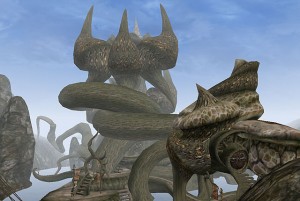 So we’ve got a bunch of elves who ranch bugs and wear clothes made out of insect shells and giant jellyfish leather wandering around and living in houses that may be inspired by Middle Eastern or Asian architecture or may also be a giant mushroom. This just gets better and better, doesn’t it?
So we’ve got a bunch of elves who ranch bugs and wear clothes made out of insect shells and giant jellyfish leather wandering around and living in houses that may be inspired by Middle Eastern or Asian architecture or may also be a giant mushroom. This just gets better and better, doesn’t it?
Let’s keep going. Traditionally the Dunmer worship the Daedra, powerful demonlike gods whom most of civilized Tamriel won’t touch with a ten-foot-pole. But for the past several generations the citygoing Dunmer have been worshipping three “mortal” gods who make up what is called the Tribunal. The Tribunal consists of a powermad and ruthlessly intelligent woman named Almalexia, a reclusive wizard building himself a literal clockwork universe named Sotha Sil, and finally Vivec, a bi-colored warrior-poet who may or may not be both male and female at the same time.
Needless to say, they’re a pretty fantastic trio.
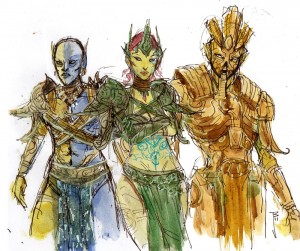
Much like the Dunmer themselves, the gods are neither good nor bad. They exist in a constant state of gray between the two extremes and they are capable of much good and also much evil. The Morrowind universe is not black and white. The Dunmer are intensely xenophobic. Slavery is legal. So is assassination. And yet, as you play the game, you come to care for this place and its people anyway. And that, readers, is the true triumph of Morrowind and how its very non-standard and non-Western culture is used as a fantastic narrative device. Your character isn’t the only one to come into this world as an outlander– you do, too. Then as you come to know and love the land and its inhabitants, you can decide whether or not to save it. You learn about this strange new world as you go along and then travel through an arc much as your character does. Would this have worked out as well in a more traditional fantasy setting? Maybe, or maybe not. I’m leaning toward the “maybe not”.
Unfortunately, although the series continues, The Elder Scrolls has yet to achieve another setting as intensely unique as Morrowind’s. Although originally established as a rainforest, Talos conveniently showed up and turned Cyrodiil into an idealized medieval England just in time for Oblivion. (This is what that guy in Whiterun is always yelling about, by the way.) While this is a neat piece of lore, it does mean that Oblivion was largely set in a very traditional fantasy setting. The next game, Skyrim, went for something slightly more exotic by making everything Nordic-themed, but that is still an overall very “safe” Western setting. The upcoming TES Online has the potential to do some interesting things with provinces like Elsweyr and Hammerfell, but seeing as they’ve already retconned out the aforementioned Talos story and cemented Cyrodiil as an Idealized Medieval England simulator regardless of time period, my hopes for anything beyond fleeting oddities aren’t very high.
So here I am, waiting. Waiting for more elves that live in yurts and adorn themselves with tribal tattoos and crazy piercings. Waiting for more games that take their fantasy out of Western Europe, and not just for one throwaway setting or expansion pack.
Meanwhile, I’ll be in Vvardenfell.

